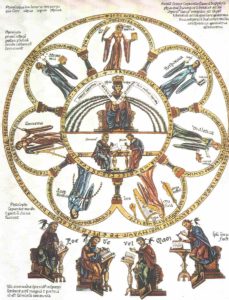Liberal Arts
“The seven liberal arts do not adequately divide theoretical philosophy; but, as Hugh of St. Victor says, seven arts are grouped together (leaving out certain other ones), because those who wanted to learn philosophy were first instructed in them. And the reason why they are divided into the trivium and quadrivium is that “they are as it were paths (viae) introducing the quick mind to the secrets of philosophy.” This is also in harmony with the Philosopher’s statement in the Metaphysics that we must investigate the method of scientific thinking before the sciences themselves. And the Commentator says in the same place that before all the other sciences a person should learn logic, which teaches the method of all the sciences; and the trivium concerns logic. The Philosopher also says in the Ethics that the young can know mathematics but not physics, because it requires experience. So we are given to understand that after logic we should learn mathematics, which the quadrivium concerns. These, then, are like paths leading the mind to the other philosophical disciplines.”
–St. Thomas Aquinas (Commentary on Boethius’ “On the Trinity” V.1.reply to 3)

Trivium and Quadrivium
The classical liberal arts have long been considered the natural beginning of a liberal education; for they allow us to discover order in things more familiar to us as well as provide the means for inquiry into more difficult matters. The liberal arts include the arts of the trivium—grammar, logic (or dialectic), and rhetoric—and of the quadrivium—arithmetic, geometry, music, and astronomy. The trivium, or “three ways,” are the arts of the word or of human speech; the quadrivium, or “four ways,” are the arts of quantity or of number, broadly construed. These arts have been defined in various ways over the centuries, and one of the purposes of our project is to clarify what these arts are and how to use them. Even so, perhaps a good starting point for defining the liberal arts is the account of them offered by Hugh of St. Victor in his Didascalicon, a twelfth-century work in which he gathers together a long tradition of thinking about the liberal arts and liberal education. Hugh defines the trivial arts as follows: “Grammar is the knowledge of how to speak without error; dialectic [or logic] is clear-sighted argument which separates the true from the false; rhetoric is the discipline of persuading to every suitable thing” (Taylor translation, Columbia UP). As for the quadrivium, Hugh says: “Arithmetic is ... the science of numbers. Music is the distinguishing of sounds and the variance of voices ... [or] the concord of a number of dissimilar things blended into one. Geometry is the discipline treating immobile magnitude, and it is the contemplative delineation of forms.... Astronomy is the discipline which examines the spaces, movements, and circuits of the heavenly bodies at determined intervals” (ibidem). Those versed in the trivium, then, are enabled to speak, to reason, and to convince (as well as to discern how well others are doing so when they speak or write); while those versed in the quadrivium are equipped to articulate various types of order discoverable in the physical, sensible world we inhabit. To be sure, such skills and knowledge are good in themselves, and yet they also prepare one for inquiring into higher, more difficult matters. The liberal arts, therefore, constitute the essential beginning stage of liberal education.
Liberal Arts and Liberal Education
The central goal of the Arts of Liberty Project is to provide those engaged in the noble art of teaching with abundant resources to fulfill their mission. We believe that the liberal arts in particular and liberal education in general are the surest, most time-tested way to direct students toward a life that is truly free. The liberal arts develop foundational skills that free an individual to investigate the order in things, especially in human speech and in nature, while liberal education bespeaks the free pursuit of more universal knowledge that involves historical, philosophical, and theological inquiries, which are often exemplified in the great books. No one worth his salt has ever thought, of course, that the liberal arts and liberal education are certain, guaranteed paths to freedom; to think so would be to deny the very freedom this tradition of education seeks to enliven and foster. Rather, by developing these skills and growing in such knowledge, the one who studies the liberal arts and engages in liberal education puts himself in an excellent position to cultivate the moral and intellectual virtues that free him from vice and ignorance. Thus, when we speak of liberal arts and liberal education, the sense of “liberal” we have in mind is “what is conducive to liberating the mind and heart.” Toward this end, the liberal arts and liberal education are meant to assist the diligent, well-disposed student in his pursuit of the true, the good, and the beautiful.
Our Courses on the Liberal Arts
In the Liberal Arts section of the website, we have lesson plans for complete, one- or two-semester courses on the liberal arts. These lesson plans could be used in many different ways. For instance, one could use them as a basis for a new college-level course on one or more of the liberal arts; one could use them piecemeal as modules within existing courses; or one could use them simply to enrich one’s own education, brushing up on or expanding one’s own knowledge of the liberal arts. In one way or another, we hope that you find these lesson plans helpful in your study of the liberal arts.
Quotations on the Nature of the Liberal Arts
"Out of all the sciences above named, however, the ancients, in their studies, especially selected seven to be mastered by those who were to be educated. These seven they considered so to excel all the rest in usefulness that anyone who had been thoroughly schooled in them might afterward come to a knowledge of others by his own inquiry and effort rather than by listening to a teacher. For these, one might say, constitute the best instruments, the best rudiments, by which the way is prepared for the mind's complete knowledge of philosophic truth. Therefore they are called by the name trivium and quadrivium, because by them, as by certain ways (viae), a quick mind enters into the secret places of wisdom." –Hugh of Saint Victor (Didascalicon. Translated by Jerome Taylor, Columbia UP, 1961, pp. 86-87)
"It is in the seven liberal arts, however, that the foundation of all learning is to be found. Before all others these ought to be had at hand, because without them the philosophical discipline does not and cannot explain and define anything. These, indeed, so hang together and so depend upon one another in their ideas that if only one of the arts be lacking, all the rest cannot make a man into a philosopher" (ibid, pp. 89)
"The method of liberal education is the liberal arts, and the result of liberal education is discipline in those arts. The liberal artist learns to read, write, speak, listen, understand, and think. He learns to reckon, measure, and manipulate matter, quantity, and motion in order to predict, produce, and exchange. As we live in the tradition, whether we know it or not, so we are all liberal artists, whether we know it other not. We all practice the liberal arts, well or badly, all the time every day. As we should understand the tradition as well as we can in order to understand ourselves, so we should be as good liberal artists as we can in order to become as fully human as we can. The liberal arts are not merely indispensable; they are unavoidable. Nobody can decide for himself whether he is going to be a human being. The only question open to him is whether he will be an ignorant, undeveloped one or one who has sought to reach the highest point he is capable of attaining. The question, in short, is whether he will be a poor liberal artists or a good one." –Robert M. Hutchins (The Great Conversation: The Substance of a Liberal Education. pp.4-5)
"Even in speculative matters there is something by way of work; for examples, the making of a syllogism or of a fitting speech, or the work of counting or measuring. Hence whatever habits are ordered to such works of the speculative reason, are by a kind of comparison called arts indeed, but liberal arts, in order to distinguish them from those arts that are ordered to works done by the body, which arts are, in a fashion, servile, in so far as the body is in servile subjection to the soul, and man, as regards his soul, is free (liber). On the other hand, those sciences which are not ordered to any work of this kind are called sciences absolutely, and not arts." –St. Thomas Aquinas (Summa Theologiae I-II.57.3)
"I think, however there is nothing useful in the other branches of learning that are found among the heathen, except information about objects, either past or present, that relate to bodily senses, in which are included also the experiments and conclusions of the useful mechanical arts, except also the sciences of reasoning and of numbers." –St. Augustine (On Christian Doctrine II.39)
"Instruction in the liberal arts, in moderation and to the point, produces lively, persevering, and refined lovers of truth. Their aim is ardently to desire, constantly to pursue, and eventually lovingly cling to what is called, Licentius, the happy life." –St. Augustine (On Order I.24)
"Take now music, geometry, the motion of the heavens, number theory. Order is so overpowering in these, that anyone seeking its source will either find it there, or will be led to it through them without error. This learning (in moderation, for nothing is more fearful than excess in these matters) forms excellent defenders and teachers of philosophy. They will attain themselves, and lead many to attain, that high standard beyond which nothing can or ought to be demanded or desired. From that vantage point, even in the think of human affairs, they will size down and judge everything according to its real worth." –St. Augustine (On Order II.14)
"To go further, one has to have a good mind, be of mature age, enjoy leisure, and have enthusiasm for study, enough to pursue the order of the disciplines just analyzed. Getting acquainted with the liberal arts, however, whether pursued for the sake of usefulness or for the sake of knowledge and contemplation, is extremely difficult. It is necessary to be most clever and to start from childhood with unfaltering attention and perseverance." –St. Augustine (On Order II.44)

